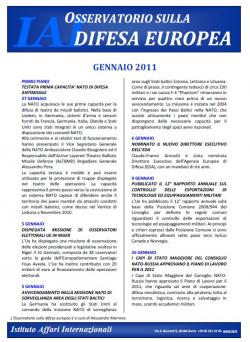Observatory on European defence, March 2011
March 22-31, 2011
NATO INTERVENES IN LIBYA
Following the UN resolution 1973/2011 of March 17, a coalition of European and North American governments jas launched military operations in Libya, aimed at protecting the civilian population by the use of force of the Libyan armed forces, primarily through the imposition of a no-fly zone over Libya and the implementation of the embargo on arms supplies.
On March 22, NATO has taken over the command of naval embargo on the provision of weapons, equipments and mercenaries to Libya. The NATO fleet, including submarines and aircrafts, is authorized to stop and search vessels in transit through the Mediterranean, but the fleet is not allowed to enter the territorial waters of Libya. The commander of the operation is Admiral Rinaldo Veri, who manages the operations from Naples NATO Operational HeadQuarter.
On March 24, NATO has been assigned to enforce the no-fly zone that includes a ban on Libyan flights in the airspace for all aircraft belonging to any of the parties in conflict, with the exception of aircraft used for humanitarian aids.
On March 31, NATO has taken over the command of all military operations, organized in the “Operation Unified Protector”, aimed at enforcing the UN resolution 1973 / 2011. These operations include: the implementation of the naval embargo; the enforcement of the no-fly zone; military actions intended to protect civilians Libyans and areas populated by them from attacks and threats of attack. With respect to these operations, once identified the forces that present a threat against civilians, NATO acts to hit them on the ground or in flight. In the first week of operations, NATO has carried out 1,000 air sorties, including 400 attack sorties. NATO ground troops in Libya are not expected, due to the prohibition expressed by the UN resolution 1973/2911.
March 21-24, 2011
EU EXTENDS SANCTIONS AGAINST LIBYA AND BELARUS AND FREEZES THE EGYPTIAN FUNDS
On March 24 the EU Council, following the UN resolution 1973/2011, has extended the restrictive measures against those responsible for the use of force and violence against the Libyan citizens. The Council has banned the transit on European airspace of every vehicle suspected of carrying banned materials in Libya and has imposed a ban of entry in EU to 11 Libyan citizens. Finally the Council has extended the freezing of financial assets to entities designated by the UN resolution 1973/2011 as accessories of human rights abuses violating the international law, including National Oil Corporation. The Council also passed a regulation to enforce the freeze of assets.
Previously the EU Foreign Affairs Council decided to freeze funds and assets controlled by nineteen persons for embezzlement of Egyptian state assets, including former President Hosni Mubarak. The Council also added nineteen Belarusian officials to the list of persons under restrictive measures decide in October 2010 due to the severe situation in the country.
March 25, 2011
FRONTEX EXTENDS OPERATIONS IN LAMPEDUSA
EU Agency FRONTEX has extended until August 2011 the mission “Joint Operation Hermes 2011”, which began in February with the dispatch in Lampedusa of thirty officials. They were deployed in the island to assist the identification of the immigrants landed and to assist the repatriation of those who haven’t the asylum requirements. Two surveillance aircrafts have been added to the other equipments of the little EU mission operating in Lampedusa, but no decision has been taken on the creation of an emergency fund to contribute to the expenditures made by the Italian Government to face the migration flow.
March 28-31, 2011
NEW APPOINTMENT FOR THE EUROPEAN EXTERNAL ACTION SERVICE
High Representative Catherine Ashton appointed some senior officials, including the Italian Mariangela Zappia as Head of EU delegation to the UN organizations in Geneva.
-
Details
Roma, Istituto affari internazionali, 2011, 2p. -
Issue
11/03



